


Pharmaceutical regulatory affairs is essential for ensuring that medications and medical devices adhere to safety and quality regulations, thereby safeguarding public health. This field has evolved significantly, playing a pivotal role in drug development. Compliance professionals are vital in navigating the complex regulatory landscape, yet they face numerous challenges in a rapidly changing legal environment. Understanding these dynamics is crucial for anyone involved in clinical research.
Pharmaceutical regulatory affairs play a pivotal role in ensuring that medications and medical devices meet stringent safety and efficacy standards before reaching consumers. As the landscape of drug development becomes increasingly complex, professionals in this field navigate a maze of regulations and compliance requirements essential for public health. With rapid advancements in technology and evolving global regulations, how can these professionals effectively balance innovation with compliance? This article delves into the critical functions of pharmaceutical regulatory affairs, tracing its evolution and highlighting the significant challenges and opportunities that lie ahead.
Pharmaceutical regulatory affairs is a critical domain that ensures that pharmaceutical products, encompassing medications and medical devices, comply with all pertinent regulations and laws. This field encompasses a wide range of activities, including:
Compliance specialists act as vital intermediaries in pharmaceutical regulatory affairs between pharmaceutical companies and regulatory organizations, ensuring that products are not only safe and effective but also of the highest quality before they reach the market. Their contributions are essential in safeguarding public health and safety by guaranteeing that all pharmaceutical products adhere to stringent compliance standards.
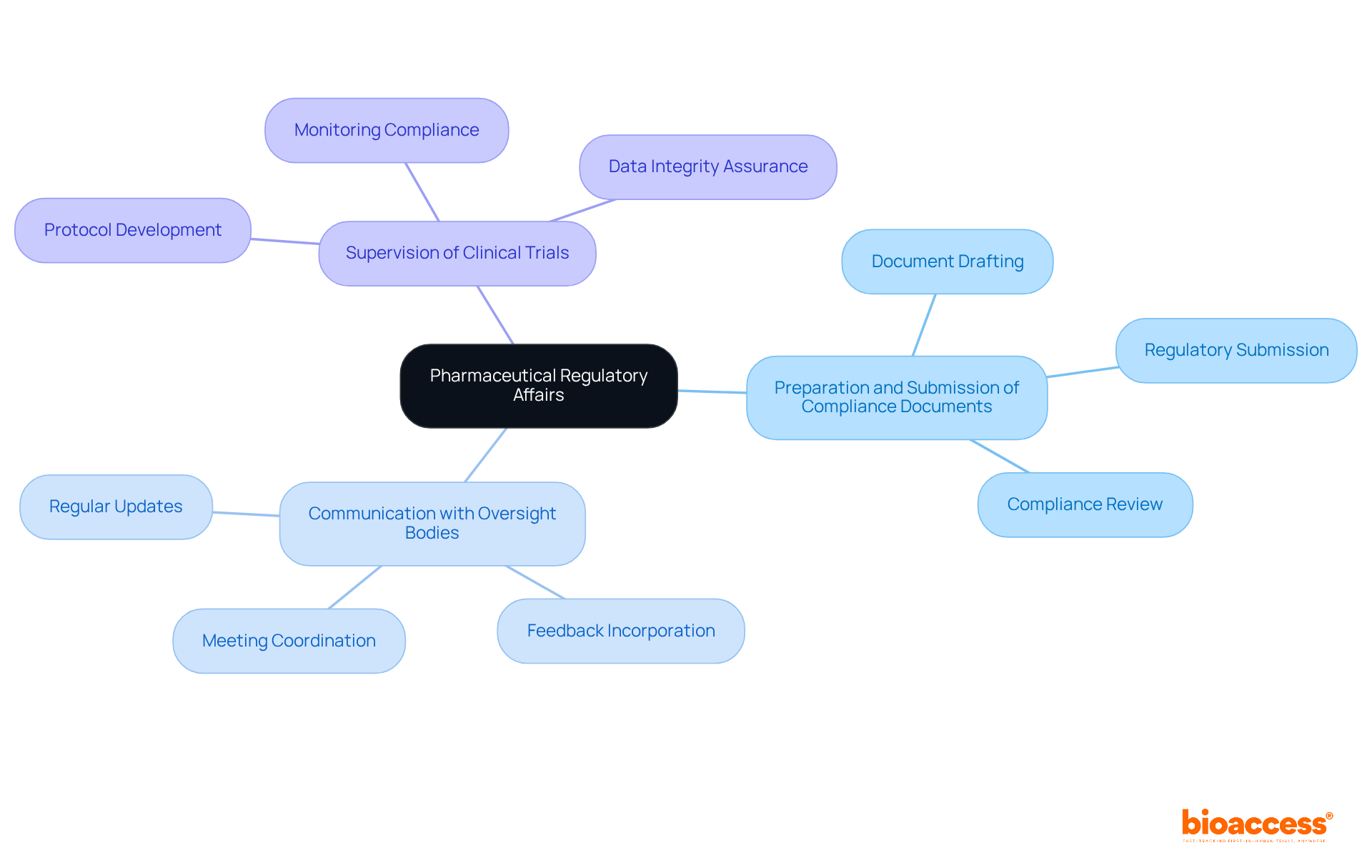
The development of compliance affairs in pharmaceuticals commenced in the early 20th century, marked by pivotal milestones that have significantly shaped the industry. The Pure Food and Drug Act of 1906 established a groundbreaking system designed to prevent the sale of misbranded or adulterated foods and drugs, laying a solid foundation for future regulations. Subsequent incidents, notably the sulfanilamide tragedy in 1937, underscored the urgent need for stricter oversight, culminating in the establishment of the Food and Drug Administration (FDA) in the United States. This agency has become crucial in ensuring the safety and efficacy of medical products.
The introduction of the Drug Amendments in 1962 markedly improved the oversight landscape by mandating proof of both efficacy and safety prior to drug approval. This shift not only fortified consumer protection but also set a precedent for rigorous clinical testing standards. Over the decades, the oversight framework has consistently adapted, responding to emerging challenges such as advancements in biotechnology, the rise of digital health technologies, and the push for global harmonization of oversight practices.
Statistics indicate a robust growth trajectory in the compliance market, projected to increase from USD 13.9 billion to USD 31 billion between 2021 and 2030, with a compound annual growth rate (CAGR) of nine percent. This growth illustrates the increasing complexity of drug development and the rising number of clinical trials, underscoring the essential role of compliance in the pharmaceutical industry today.
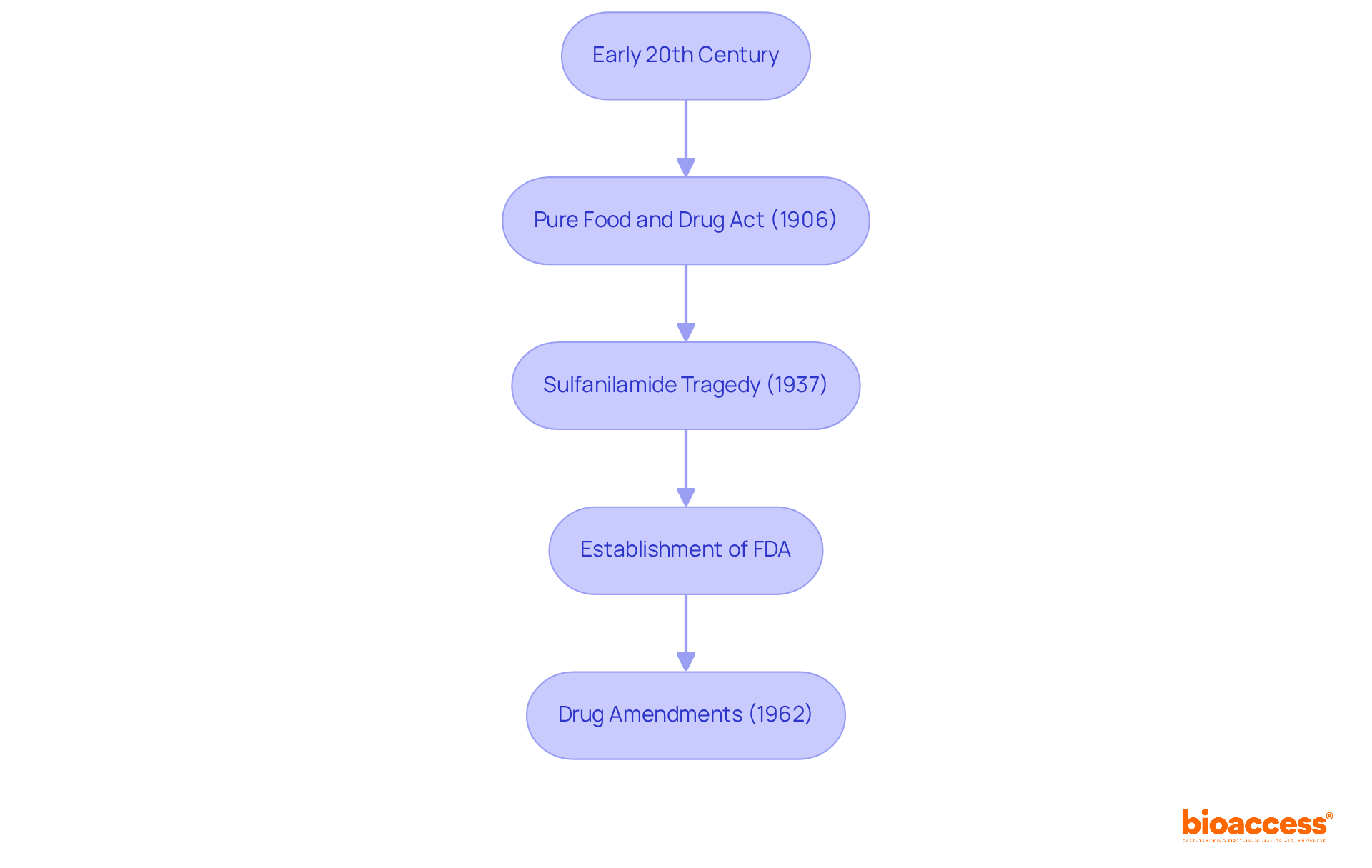
Professionals in pharmaceutical regulatory affairs perform a variety of essential functions within the pharmaceutical industry. Their main duties involve preparing and submitting compliance documents, such as Investigational New Drug (IND) applications and New Drug Applications (NDA). They also interact with oversight bodies to ensure adherence to rules and guidelines. Furthermore, compliance affairs professionals oversee clinical trials, ensuring that they adhere to Good Clinical Practice (GCP) standards. They play an essential role in risk evaluation, strategic planning, and the creation of compliance strategies that align with business objectives.
In the context of Latin America, navigating the compliance landscape presents unique challenges and opportunities. Organizations like bioaccess® facilitate medical device clinical trials by offering comprehensive services, including:
Their expedited approval process can achieve results in 6-8 weeks compared to the 6-12 months common in the US/EU. This significantly enhances patient enrollment for cardiology and neurology groups, making them a key player in overcoming compliance challenges for startups in the region.
The collaboration between pharmaceutical regulatory affairs professionals and organizations like bioaccess® is crucial for ensuring that products meet necessary safety and efficacy standards throughout their lifecycle. As the Medtech landscape evolves, it is imperative for stakeholders to consider their own challenges in clinical research and seek partnerships that can streamline compliance processes and drive success.
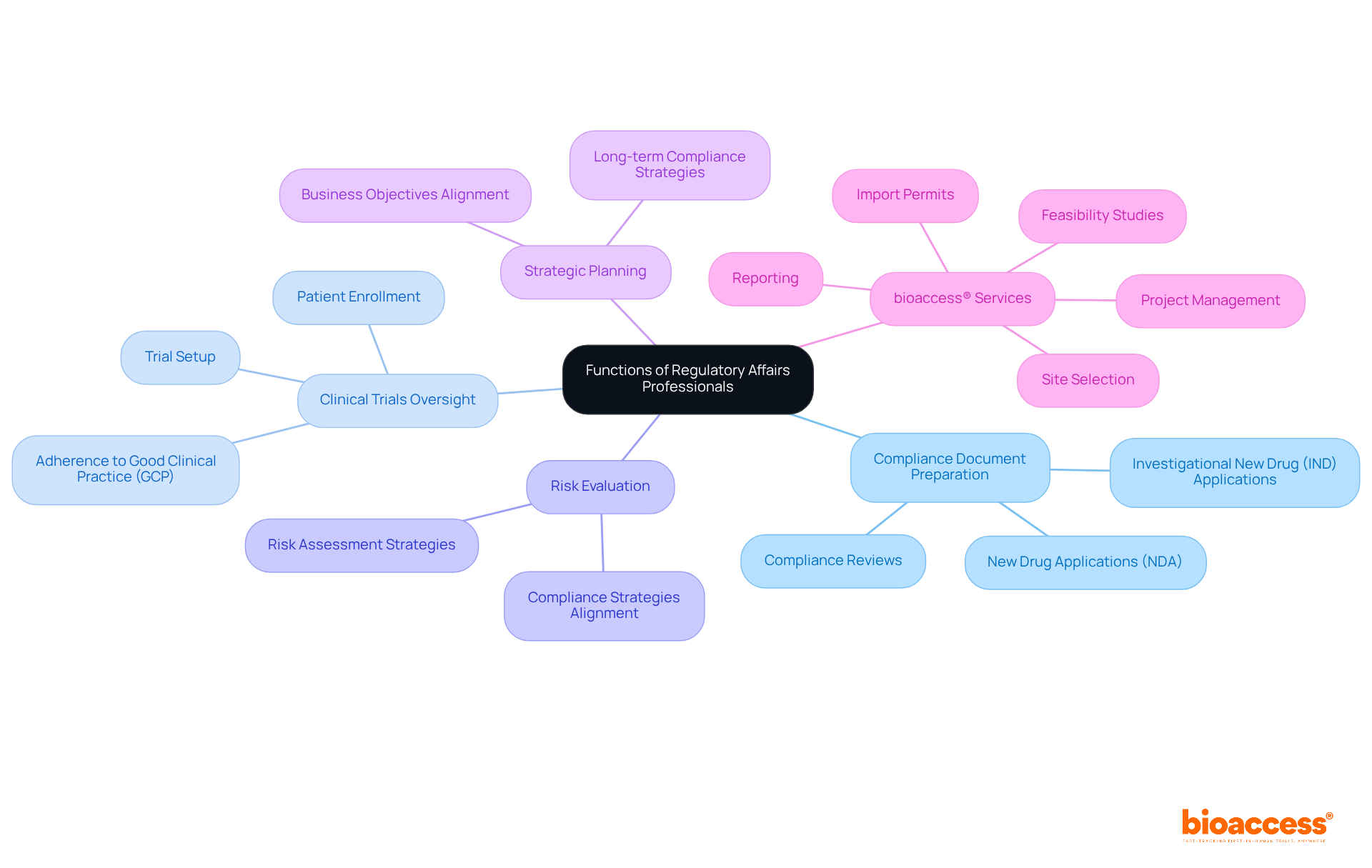
Pharmaceutical regulatory affairs exert a significant influence on drug development, affecting every phase from initial research to market entry. By ensuring compliance with legal requirements, professionals in pharmaceutical regulatory affairs streamline the approval process, thereby reducing the time it takes for new drugs to reach patients. Their involvement in research studies guarantees that investigations are conducted ethically and that data is collected in accordance with compliance standards. Furthermore, professionals in pharmaceutical regulatory affairs are instrumental in navigating the complexities of global markets, assisting companies in understanding and meeting the diverse regulatory requirements across various countries. This not only facilitates smoother market access but also enhances the overall quality and safety of pharmaceutical products, ultimately benefiting public health.
In Colombia, initiatives driven by bioaccess™ in collaboration with Caribbean Health Group aim to position Barranquilla as a leading hub for medical studies in Latin America. With the support of Colombia's Minister of Health, these initiatives are designed to expedite clinical trial processes, achieving over a 50% reduction in patient recruitment time while ensuring high retention rates. By leveraging bioaccess®'s expertise, including the 'Sprint reglamentario' for approvals in as little as 6-8 weeks, Medtech and Biopharma startups can navigate compliance challenges more effectively, significantly faster than traditional timelines.
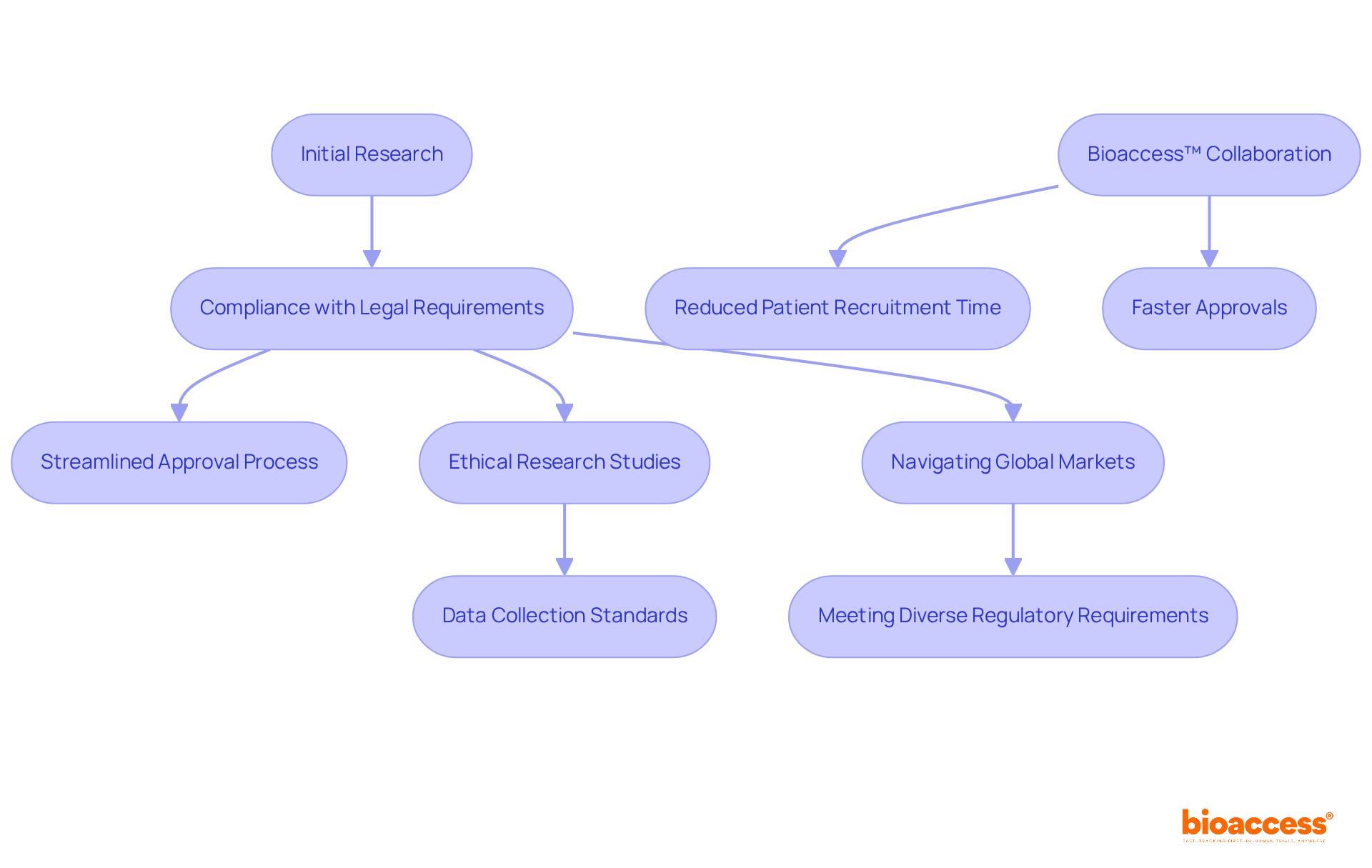
Professionals in pharmaceutical regulatory affairs face numerous challenges in their work. One significant challenge is the frequently changing legal environment, necessitating that they remain informed about new laws, guidelines, and best practices. The complexity of global regulations can also create hurdles for companies aiming to enter multiple markets. Professionals in pharmaceutical regulatory affairs must manage the delicate balance between innovation and compliance, ensuring that new therapies are developed while adhering to stringent safety and efficacy standards. Furthermore, the growing adoption of digital health technologies and personalized medicine introduces new oversight considerations that must be addressed.
To navigate these challenges effectively, professionals in pharmaceutical regulatory affairs must employ:
Services provided by bioaccess, such as:
can significantly aid in overcoming these complexities. By leveraging comprehensive clinical trial management services, regulatory professionals can enhance their ability to meet regulatory requirements and expedite the clinical trial process. This ultimately benefits medical device startups that face regulatory hurdles, competition, recruitment issues, and financial constraints.
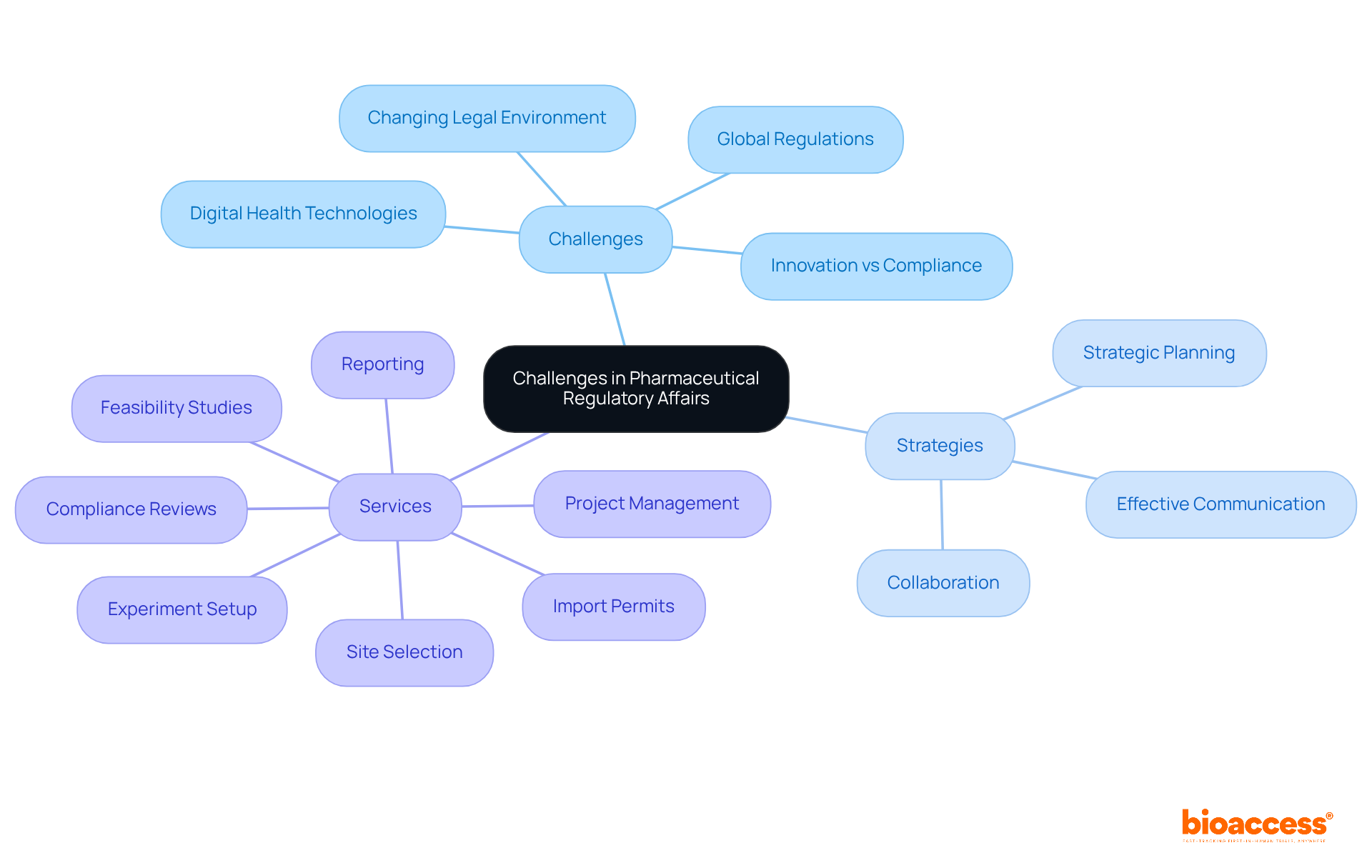
Pharmaceutical regulatory affairs are essential to the healthcare landscape, ensuring that medications and medical devices adhere to rigorous safety and efficacy standards prior to market entry. This discipline not only protects public health but also facilitates the intricate journey of pharmaceutical products from research to consumer accessibility. By ensuring compliance with evolving regulations, regulatory affairs professionals serve as vital links between pharmaceutical companies and regulatory bodies, fostering trust and transparency within the industry.
The article outlines the evolution of regulatory affairs, tracing its origins from early 20th-century legislation to the current dynamic regulatory environment. Key milestones, such as the establishment of the FDA and the implementation of stringent drug approval processes, underscore the ongoing commitment to consumer safety. Furthermore, the article highlights the multifaceted roles of regulatory affairs professionals—from document preparation to overseeing clinical trials—and the unique challenges they encounter in a rapidly changing global landscape.
As the pharmaceutical industry continues to expand and innovate, the significance of regulatory affairs cannot be overstated. Stakeholders are urged to prioritize collaboration with regulatory professionals and organizations capable of streamlining compliance processes. By embracing this approach, they not only enhance their prospects for successful product launches but also contribute to the overall improvement of public health outcomes. Embracing the complexities of regulatory affairs is vital for fostering innovation while ensuring that safety remains paramount in drug development.
What is pharmaceutical regulatory affairs?
Pharmaceutical regulatory affairs is a critical field that ensures pharmaceutical products, including medications and medical devices, comply with relevant regulations and laws. It involves activities such as preparing and submitting compliance documents, communicating with oversight bodies, and supervising clinical trials.
What role do compliance specialists play in pharmaceutical regulatory affairs?
Compliance specialists act as intermediaries between pharmaceutical companies and regulatory organizations, ensuring that products are safe, effective, and of high quality before reaching the market. Their work is essential for safeguarding public health by adhering to stringent compliance standards.
How has regulatory affairs in pharmaceuticals evolved over time?
The evolution of regulatory affairs began in the early 20th century, highlighted by the Pure Food and Drug Act of 1906, which aimed to prevent the sale of misbranded or adulterated products. Key events, such as the sulfanilamide tragedy in 1937, led to the establishment of the FDA, which plays a crucial role in ensuring the safety and efficacy of medical products. The Drug Amendments of 1962 further strengthened oversight by requiring proof of efficacy and safety before drug approval.
What are some recent trends in the pharmaceutical regulatory affairs landscape?
The regulatory landscape has adapted to emerging challenges, including advancements in biotechnology, digital health technologies, and the push for global harmonization of oversight practices. The compliance market is projected to grow significantly, from USD 13.9 billion to USD 31 billion between 2021 and 2030, indicating the increasing complexity of drug development and the importance of compliance in the industry.
Why is compliance important in the pharmaceutical industry?
Compliance is vital in the pharmaceutical industry as it ensures that products meet safety and efficacy standards, protecting public health. The rising number of clinical trials and the complexity of drug development highlight the essential role of compliance in maintaining high-quality pharmaceutical products.